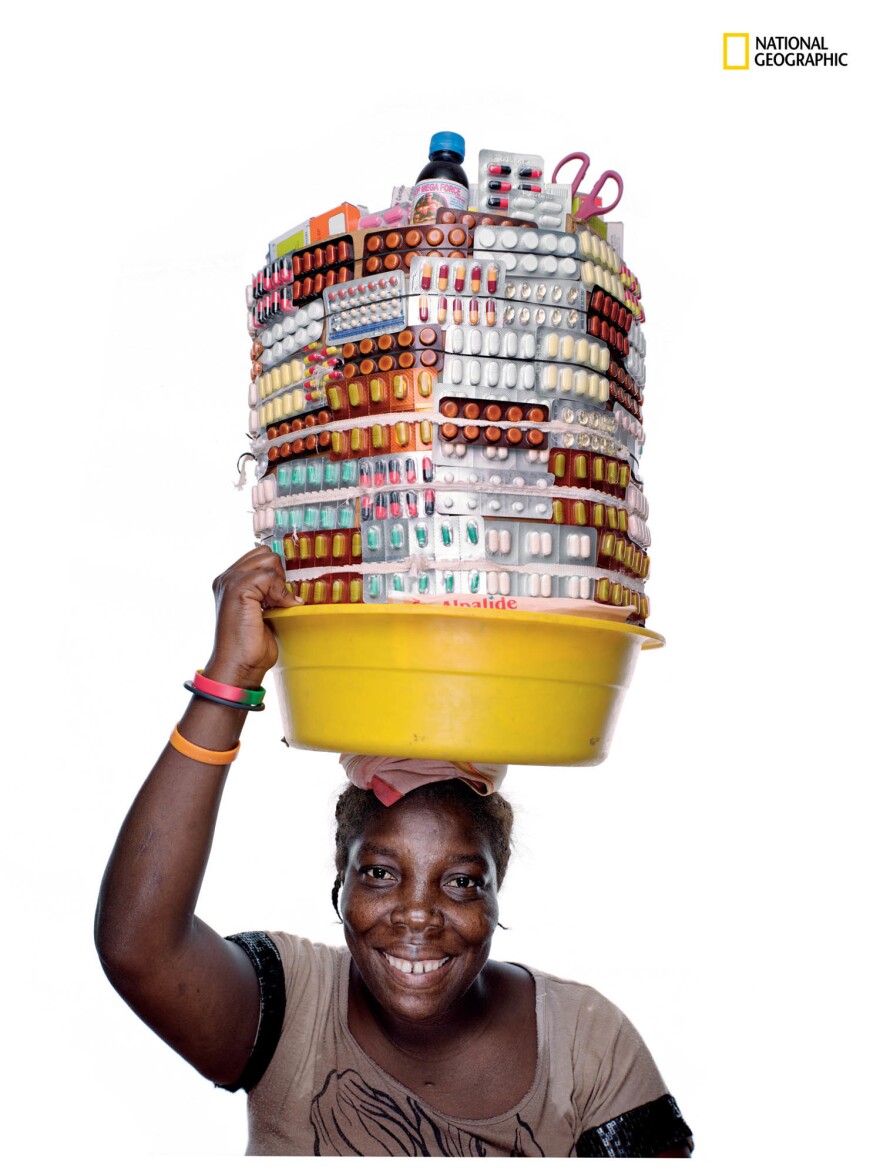There is no way to miss the medicine sellers on the streets of Port-au-Prince, Haiti's capital. They carry spires of curved cardboard covered with multicolored pills — painkillers, antibiotics, Viagra knockoffs, abortion pills and cough syrups for children.

These blister packs are arranged in rows, like a window display, to tempt customers. A pair of scissors pokes out of the top of each vendor's structure to cut up packets for buyers who can only afford one pill. All of it is held together by rubber bands and resting in a bucket. It looks like a giant, technicolor ice cream cone.
As part of a project on access to medicine around the world, journalist Arnaud Robert and two documentary photographers, Paolo Woods and Gabriele Galimberti, flew to Haiti to interview and photograph these medicine sellers. One woman told them she is just trying to support five children. One man said that's how he makes a living while he studies to become a pastor.
And it's not as if they are in competition with actual pharmacies and pharmacists. "Our street vendors, they act as doctors and pharmacists because even if families want to meet a doctor or trained pharmacist, it's very hard to find them," says Robert.
Haiti is one of the world's poorest countries and its health care system has long been weak. And according to Doctors Without Borders, the earthquake in 2010 destroyed 60 percent of what was already a fragile system.
Woods estimates that hundreds of Haitians sell medicine in streets, both in cities and the countryside. In the capital, they wander the hot, busy roads all day, earning what could amount to $5 to $8. They line up every morning, waiting to buy their supplies from big distributors that have shops in downtown Port-au-Prince. Some drugs also come from the black market in the Dominican Republic and China.
Technically, it is illegal for untrained people to sell medicine on the street. But no one seems to care. "Many things which are in theory illegal in a country where you don't have a working police system, where you don't have a working judicial system, it doesn't really make a difference," says Woods.
NPR spoke to Woods and Robert. Their work appeared in National Geographic Magazine's June 2017 issue.
This interview has been edited for length and clarity.

Why are there so few pharmacies in Haiti?
Paolo Woods:Because the economy is in shambles. If you had the capital to open a pharmacy, you're probably going to decide to leave the country instead of open a pharmacy.
How adept are Haiti's medicine sellers at giving the right medicine to people?
Woods: These people are not knowledgeable about medicine. Haitians will go to them, telling them what their condition is, and the street vendor will decide on the basis of this very little information what to give them. So the chance of them not giving the right medicine is extremely high.
Do the street vendors try to learn about the drugs they were sell?
Arnaud Robert: They were actually very willing to know about the purpose of the medicine they were selling. They were reading, if they had access to the information leaflets. Some of them were quoting some of the things they had read on the leaflets. Also they buy some of the medicine from distributors and ask them questions. 'Okay, I'm looking for that kind of antibiotics. What do you suggest?'
How do distributors sell to the street vendors and not get in trouble?
Robert: You have a few families in the country who basically own the main structures of the Haitian economy. And some of these families also own medicine distribution companies [for pharmacies as well as hospitals].
You write that sometimes vendors give out improper medicine or bad advice, like a man who had acne and was given "powerful antibiotics."
Woods:Well, none of them would give bad medication on intention. These are people who are trying to carve a living for themselves. None of the vendors will ever become rich for selling medicine on the streets. I don't think they even realize if they are making mistakes.
Robert:The problem is really the lack of infrastructure, and the fact that the distributors keep on selling medicine to the street vendors. The problem is also that in the neighboring country, the Dominican Republic, you have this industry that makes fake medicine for the Haitian market.

Does the average Haitian understand the risks of buying medicine on the street?
Robert: Basically, they don't have other choices. Maybe the only choice they have outside of buying their products through the street vendors is Voodoo medicine. That is used a lot in the countryside but also in the cities. And prayers.
Do Haitian universities train pharmacists?
Robert:Absolutely. They are still training pharmacists. The problem is a lot of them, if they have an opportunity to move after they are formally trained, they do it.
Paolo, why did you and Gabriele photograph the street vendors in an apartment against a white backdrop instead of on the streets?
Woods: We wanted to photograph them as single human beings, and the object they were carrying as something beautiful even in a perverse way. They take much care to make this object attractive to the public. It has to look like a candy story would for a child, something you feel attracted to that will make you want to buy.
When the vendors get sick, what do they do?
Robert: One of the street vendors mentioned that he was sick at one point. And actually, he used the medicine he sells. It shows that they don't want to cheat the people they are selling the products to.
Sasha Ingber is a multimedia journalist who covers science, culture and foreign affairs for such publications asNational Geographic andSmithsonian . Contact her @SashaIngber
Copyright 2020 NPR. To see more, visit https://www.npr.org. 9(MDAyNDY5ODMwMDEyMjg3NjMzMTE1ZjE2MA001))


